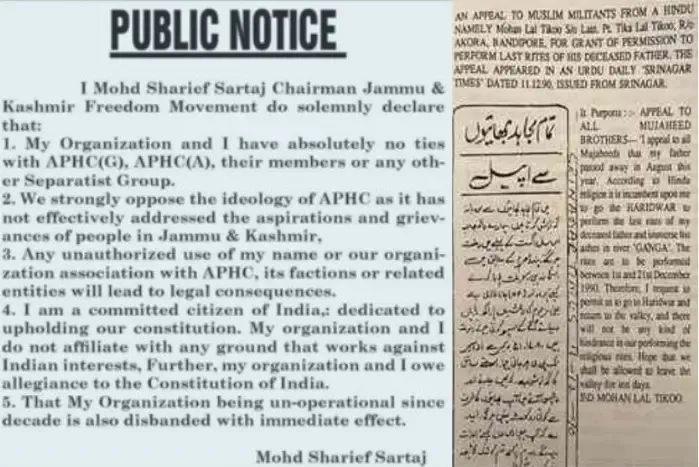FairPoint: Hurriyat Affiliates Shift Stance in Kashmir, But Scars Remain

Synopsis
Key Takeaways
- Four Hurriyat affiliates have renounced separatism.
- Commitment to the Constitution of India has been reaffirmed.
- Separatist groups have faded following Article 370's abrogation.
- The climate of fear created by separatists has diminished.
- Increased speculation of more groups following suit.
New Delhi, March 30 (NationPress) Recently, four affiliated groups of the Hurriyat Conference have cut ties with separatism, committing themselves to the Constitution of India and pledging to refrain from aligning with entities that oppose the nation.
This announcement was made by Union Home Minister Amit Shah, who praised the decision, asserting, "Separatism is now a thing of the past in Kashmir."
This is indeed the case, especially following the abrogation of Article 370. All separatist groups, which previously posed threats to the Union of India and received backing from multiple countries in various international arenas, have faded into obscurity -- along with their allies. The cyclical nature of time has unfolded.
For nearly three decades, these organizations promoted the agendas of terrorists, coercively manipulating innocent civilians, silencing dissenters, and driving minorities from their homes. Since 1989, there were periods in Kashmir when terror and separatist factions compelled individuals to publicly declare anti-India sentiments and publish apologies in local newspapers for any perceived pro-India actions.
Terrorist organizations also openly issued threats via leaflets or through local Urdu publications. The separatist groups, functioning under the banner of the Hurriyat Conference, exacerbated the climate of fear fueled by Pakistan-backed terrorist entities, justifying the violence particularly against Hindu and Sikh minorities.
They created financial pathways for Pakistan-supported organizations and other international factions to maintain unrest in Kashmir, orchestrating stone-pelting events, assaults on security personnel, and promoting radicalization.
Between 1989 and 1992, local Urdu newspapers such as Chattan, Srinagar Times, Aftab, and Alsafa dutifully printed open threats from terrorist groups and their supporters. Employees of the government or anyone associated with Indian institutions were coerced into publicly dissociating.
Among those who were made to issue public apologies were two Kashmiri Hindu announcers at Radio Kashmir who were specifically targeted. One of them was even shot at. Both were compelled to publicly sever ties with Radio Kashmir through a series of apologies published in Roznama Aftab in September 1990.
Even locals, particularly Kashmiri Pandits, who needed to leave Kashmir for any reason were required to announce their intent through ads in local publications; otherwise, they risked being labeled as 'agents' and facing potential death.
After 35 years, these same or similar groups are now on a path of self-reform. It is now their turn to provide assurances and reaffirm their commitment to the Constitution and the Union of India. Consequently, they are releasing public statements affirming their allegiance to the country.
One of the four organizations to renounce separatism is J&K Tehreeq-e-Istiqlal. Its chairman, Gulam Nabi Sofi, officially disassociated from the All Parties Hurriyat Conference, stating, "I distanced myself from separatist ideology long ago, and today I formally reject it. I am a loyal and devoted citizen of India and believe in the Indian Constitution."
Likewise, the chairman of Jammu and Kashmir Freedom Movement (JKFM), Muhammad Sharief Sartaj, also declared his complete separation from the Hurriyat and other separatist factions, reinforcing his dedication to India's national integrity while announcing the dissolution of his organization.
The other two groups renouncing separatism were also affiliated with the Hurriyat: the Jammu and Kashmir People's Movement (JKPM) and the Democratic Political Movement (DPM). JKPM chairman Shahid Saleem stated that he and his organization held no sympathy for the Hurriyat, noting that it failed to address the genuine concerns of the populace. DPM’s Mohammad Shafi Reshi similarly distanced himself from the Geelani-led Hurriyat faction, citing its inability to fulfill public expectations.
Speculation arises that more organizations will follow suit, responding to the Home Minister's appeal to definitively renounce separatism.
A significant factor driving this shift is the recognition that the global landscape has changed dramatically since the abrogation of Article 370. Crackdowns on networks supporting terrorism have stifled funding avenues, most instigators are now incarcerated, and the global focus has shifted to other volatile geopolitical situations. Pakistan, which once orchestrated terrorism in Kashmir with aspirations of transforming it into an Islamic region likely to merge with it, is now embroiled in its own crisis.
Pakistan has failed to replicate a Balochistan-like scenario in Jammu and Kashmir but has succeeded in disrupting societal harmony within the region. For three decades, terror and separatist factions in Kashmir launched a relentless assault against the vulnerable Hindu minority -- constituting merely two percent of J&K's population. They drove out Kashmiri Pandits, confiscating their properties in many instances and nurturing hostility that will require a long time to mend.
These groups are now conforming, yet for three decades, they facilitated Pakistan's proxy warfare against India. They also share the burden of responsibility for the persecution of minorities, particularly Hindus.
(Deepika Bhan can be contacted at deepika.b@ians.in)










